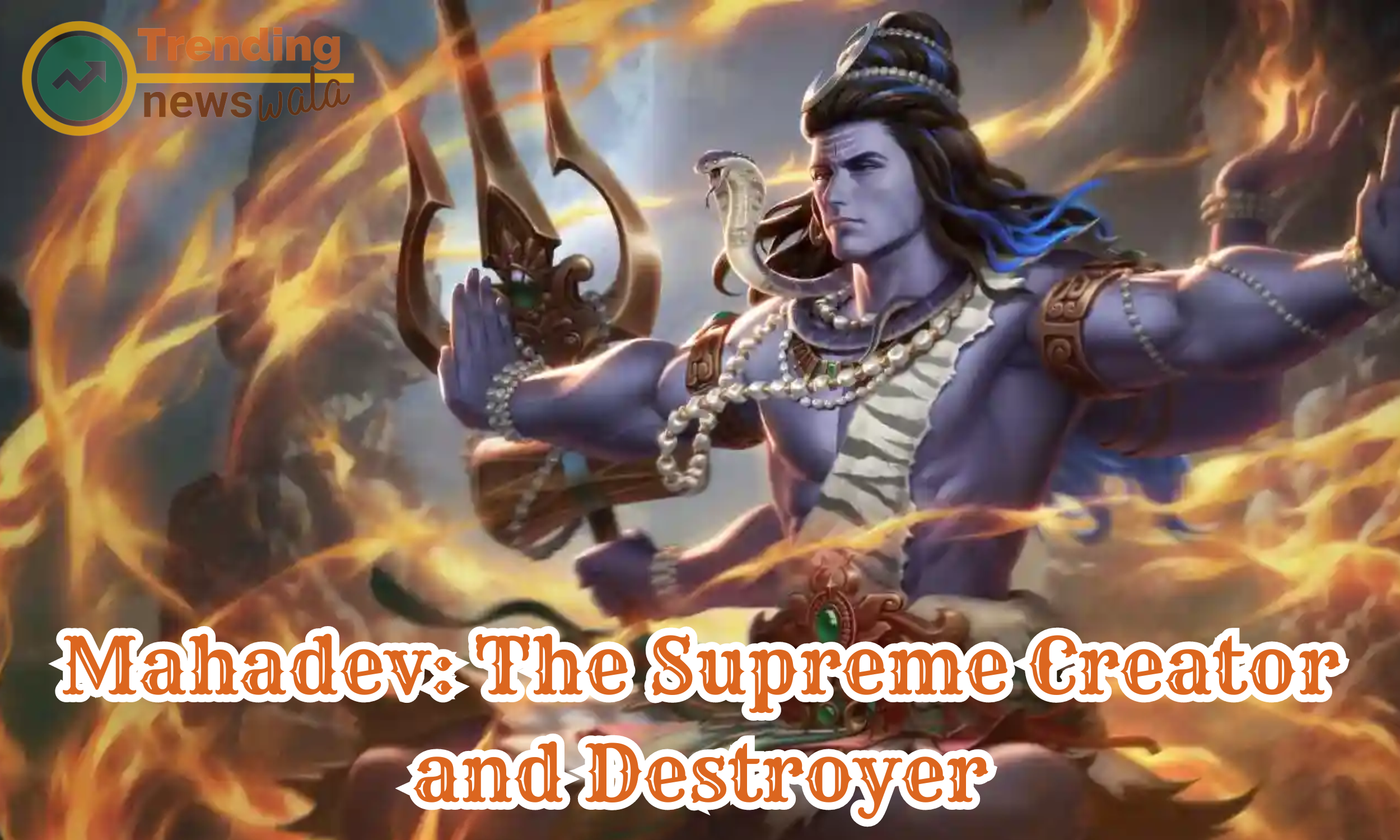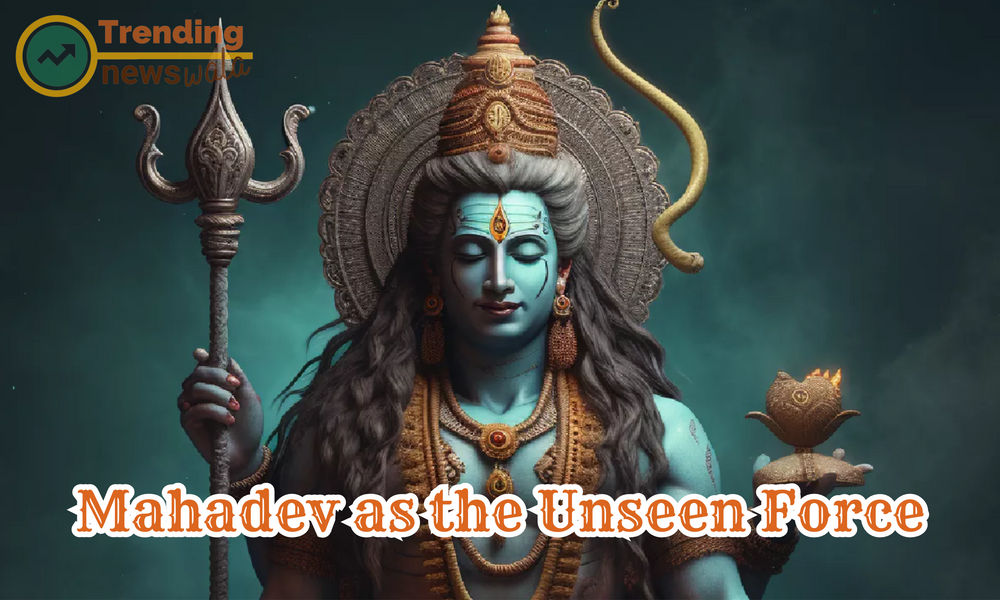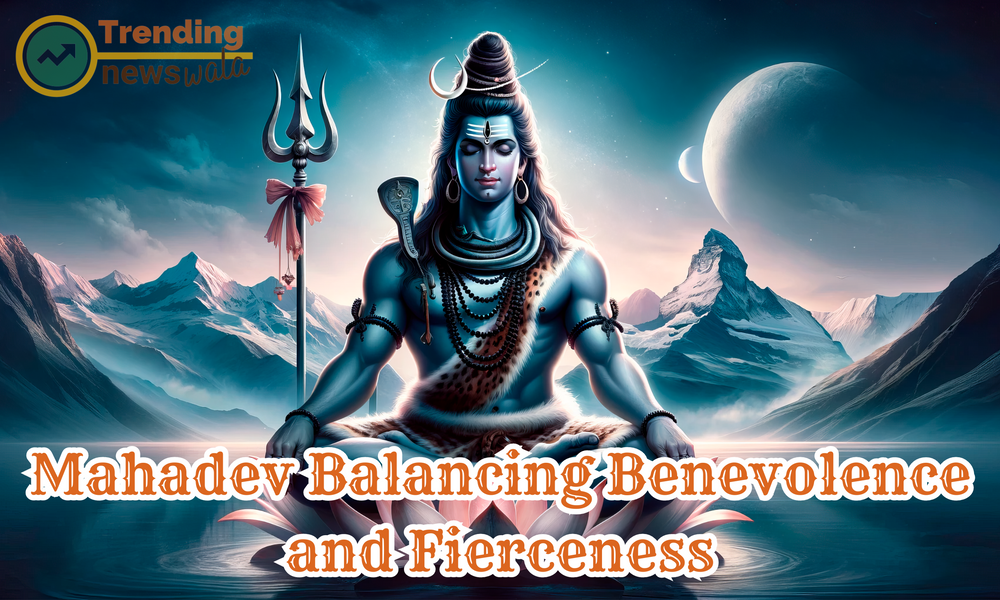If you're wondering Why lord Shiva is known as Mahadev, let me tell you! I was curious too, so I talked to many wise sadhus in India, and now I can share what I learned with you.
In India, if you ask who is the greatest of all the gods, people will say it's Mahadev. In Hinduism, there are many gods like Indra, the king of the gods; Agni, the god of fire; Surya, the god of the sun; Varuna, the god of oceans; Yama, the god of death; Hanuman, the monkey god; Ganesha, the remover of obstacles, and many more.
Among all the gods, Lord Shiva is the most powerful and the destroyer. Despite his immense power, he is also known as Bhole, which means innocent or simple-hearted. That's why he is called Mahadev, the Great God.
Among all these gods, Lord Shiva holds a special place in Hinduism. He is revered as the ultimate deity and is often called "Mahadev," which means the great god. This title shows that Mahadev has deep spiritual and universal meanings. It tells us that Mahadev is not just a god of our world but represents everything, even beyond our world.
Let's explore the stories and important spiritual ideas that explain why Lord Shiva is known as Mahadev.
Story Behind Why lord Shiva is known as Mahadev

Story Behind Why lord Shiva is known as Mahadev
Long ago in ancient India, there was a very powerful god named Shiva. He was special because he had amazing strength, wisdom, and a strong connection to everything in the universe. People called him Mahadev, which means the Great God.
The story of why Shiva is known as Mahadev starts with his incredible abilities and his important job in the universe. Shiva could do three main things: create, protect, and destroy. These were all very important to keep everything in balance in the world.
First, as the creator, Shiva made all kinds of things like stars, planets, and even galaxies using his special divine energy. But creating was just the beginning of what he did.
Shiva also had the power to protect. This meant he made sure that everything he created worked together nicely and followed the rules he set. This kept everything in order and made sure nothing got too chaotic.
But what really made Shiva Mahadev was his ability to destroy. This might sound scary, but for Shiva, destroying wasn't about being mean or causing trouble. Instead, it was about making room for new things to grow. By getting rid of what was old or no longer needed, Shiva made space for fresh starts and new life. This cycle of creating, protecting, and then starting over again showed how life keeps going in a never-ending dance.
Besides his important jobs, Shiva was known for his deep spirituality and kindness. He lived a simple life, often meditating in quiet places like mountains or forests. His peaceful way of living showed that he didn't care much about fancy things or wanting more than he needed.
People looked up to Mahadev Shiva and asked for his blessings to gain wisdom, courage, and inner peace. They believed that by thinking about him and what he stood for, they could understand more about life and the world around them.
So, Lord Shiva is called Mahadev because he represents the greatness and vastness of everything in existence. His roles as creator, protector, and destroyer show how powerful and important he is in keeping the universe in harmony. Even today, Hindus admire and respect Mahadev Shiva as the most important god, showing both his strength and how he is above everything else in the universe.
Reason Why lord Shiva is known as Mahadev

Lord Shiva Image with AI Generated
Lord Shiva is known as Mahadev because in Hinduism, he holds a very special and powerful position among all the gods. The title "Mahadev" means the Great God. Here are the reasons why:
- Creator, Preserver, and Destroyer: Lord Shiva has the unique ability to create, preserve, and destroy the universe. This triple role shows his immense power and control over all aspects of life.
- Wisdom and Compassion: Shiva is not only powerful but also wise and compassionate. He guides people on the right path and helps them overcome challenges in life.
- Symbolism: Many symbols associated with Lord Shiva, such as the third eye, the trident (trishul), and the snake around his neck, represent his unique qualities and powers.
- Cultural Importance: In Indian culture and mythology, stories about Lord Shiva illustrate his role as a teacher, protector, and source of inspiration for spiritual growth.
- Devotion and Worship: Devotees worship Lord Shiva with great reverence and seek his blessings for strength, peace, and prosperity. His name and chants like "Om Namah Shivaya" are believed to have powerful spiritual effects.
- Universal Appeal: Lord Shiva's appeal goes beyond boundaries of religion and culture. He is revered not only in India but also by people around the world who seek spiritual enlightenment and inner peace.
Some of Real Point Why Lord Shiva Known as Mahadev

Some of Real Point Why Lord Shiva Known as Mahadev
- Supreme Creator and Destroyer: Lord Shiva's Dual Powers Lord Shiva, known as Mahadev, is vital for his dual role in the universe. He oversees the cycles of creation, preservation, and destruction, symbolizing life's continuous loops.
- Cosmic Dance - Tandava: The Universe’s DanceMahadev's Tandava dance represents the cosmic rhythms of creation and destruction, blending wild energy and serene balance to mirror the universe's natural order.
- The Third Eye and Wisdom: Sight Beyond SightMahadev's third eye symbolizes deep wisdom and insight, enabling him to see beyond superficial appearances and grasp the underlying truth, representing higher perception and awareness.
- Control of Time - Kalantaka: Master of TimeAs Kalantaka, Mahadev controls the cyclical nature of time, signifying his dominion over the cosmic order and his eternal presence beyond temporal constraints.
- Universal Yogi - Adi Yogi: The First YogiMahadev, as the Adi Yogi, is the originator of yoga and spiritual practices, guiding humanity towards self-realization through his teachings.
- Renunciation and Asceticism: The Ascetic SageMahadev is often depicted as an ascetic, meditating on Mount Kailash, highlighting his renunciation of worldly desires and dedication to spiritual growth.
- Balancing Dualities - Ardhanarishvara: Unity of OppositesMahadev embodies Ardhanarishvara, a form combining both male (Shiva) and female (Parvati) aspects, signifying the harmonious integration of masculine and feminine energies.
- Devotion and Compassion: The Compassionate DeityDevotees worship Mahadev with reverence, seeking his blessings for spiritual growth and inner peace, emphasizing his compassionate and approachable nature.
- Destruction for Regeneration: Clearing the PathMahadev's role as the destroyer is essential for regeneration and renewal, making destruction a necessary step in the cycle of creation for new beginnings.
- Om Namah Shivaya - Chanting for TransformationThe sacred mantra "Om Namah Shivaya" is chanted to invoke Mahadev's divine presence, believed to have transformative power and align the practitioner with Lord Shiva's spiritual essence.
Summary
The significance of Lord Shiva as Mahadev encompasses his roles in cosmic creation, destruction, wisdom, transcendence, and the harmonious balance of dualities. Devotees turn to Mahadev for guidance on their spiritual journey, seeking blessings for inner transformation and a deeper understanding of the eternal cosmic order.

Faq For Why lord shiva is known as Mahadev
Why is Lord Shiva known as Mahadev?
Lord Shiva is known as Mahadev, which translates to "Great God" or "Supreme Deity." This title signifies Shiva's status as the ultimate and most revered divine being in Hinduism. It acknowledges his supreme authority, transcendental nature, and multifaceted role as the cosmic creator, preserver, and destroyer.
What does the title Mahadev symbolize?
The title Mahadev symbolizes Lord Shiva's omnipotence, omniscience, and omnipresence. It highlights his role as the Great Yogi, the Supreme Consciousness, and the one who governs the cosmic order. Mahadev represents the formless, eternal, and all-encompassing aspect of the divine.
How does Mahadev differ from other titles of Lord Shiva?
While other titles of Lord Shiva, such as Bholenath (the Innocent One), Rudra (the Fierce One), or Nataraja (Lord of the Dance), emphasize specific aspects of his nature, Mahadev encompasses the entirety of Shiva's divine attributes. It is a comprehensive title that acknowledges Shiva's greatness in all dimensions.
What are the qualities associated with Mahadev?
Mahadev is associated with qualities such as supreme wisdom, benevolence, fierce determination, cosmic governance, and the ability to transcend dualities. Devotees turn to Mahadev for guidance, protection, and blessings in various aspects of life, recognizing his all-encompassing and compassionate nature.
How does Mahadev relate to the concept of Adiyogi?
Mahadev's role as Adiyogi, the First Yogi, is interconnected with his title as Mahadev. Adiyogi signifies Shiva as the source of yogic wisdom, introducing the science of yoga to humanity. Both titles highlight Lord Shiva's role as the primordial and supreme force, guiding seekers on the path of self-realization.
Can Mahadev be worshipped in different forms?
Yes, devotees can worship Mahadev in various forms, each representing different aspects of his divine nature. Whether as the compassionate Bholenath, the fierce Rudra, the cosmic dancer Nataraja, or the ascetic Adiyogi, devotees can choose the form that resonates with their spiritual aspirations and connect with Mahadev accordingly.
What significance does Mahadev hold in Hindu mythology?
In Hindu mythology, Mahadev holds immense significance as the Supreme Being within the Trimurti, alongside Brahma and Vishnu. He is the creator, preserver, and destroyer of the universe, embodying the cyclical nature of creation, preservation, and dissolution.
How can one seek blessings from Mahadev?
Seeking blessings from Mahadev involves sincere devotion, prayer, meditation, and adherence to dharma (righteous living). Devotees often visit Shiva temples, perform rituals, chant mantras like "Om Namah Shivaya," and engage in acts of selfless service. A genuine heart-to-heart connection and a humble approach are key elements in seeking Mahadev's blessings.
What teachings can one derive from Mahadev's title?
Mahadev's title emphasizes the importance of recognizing the divine in all aspects of life. It teaches the devotee to approach the Supreme with humility, seeking wisdom, and understanding the cyclical nature of existence. Mahadev's teachings inspire a balanced and harmonious way of living that encompasses both the mundane and the spiritual.
Is there a specific significance of the title Mahadev in daily life?
Yes, the title Mahadev is significant in daily life as a constant reminder of the divine presence in all aspects of existence. Recognizing Mahadev's greatness encourages individuals to face life's challenges with strength, seek spiritual growth, and cultivate a deep sense of reverence for the interconnectedness of all things.





